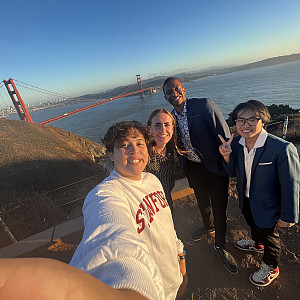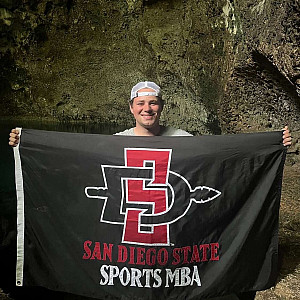Big ideas, practical applications, and a few gentle nudges
Beloit’s student-centric culture, broad liberal arts focus, and strategic nudges from mentors helped Karla Magana Figueroa’13 get the most of out of her Beloit education. While everyone may not immediately connect a liberal arts education with a career in corporate America, she’s found it to be a perfect fit for the wide-ranging projects she’s worked on as a consultant, first for IBM, then for Ernst & Young.
There are students who arrive at college so driven, it’s clear they’d be successful no matter which school they attended. Then there are students who thrive in the type of intimate academic setting that a school like Beloit affords. Where the two overlap, you have Karla Magana Figueroa’13.
Her combination of talent, work ethic, and intellect paired with Beloit’s propensity for close mentorship and wealth of opportunities acted more like a slingshot than a springboard for the current MBA candidate and IBM alumna’s career.
According to her Beloit professors, Figueroa’s trajectory toward success was evident from day one.
“Her ability to combine big ideas with practical applications always stood out to me,” says Brian Morello’85, director of Beloit’s Center for Entrepreneurship. “This is the embodiment of a liberal arts student who is her own agent and is able to secure resources in service both to her own achievement and her contribution to society.”
Figueroa seemed to leave this kind of striking impression on everyone she encountered at Beloit.
“By the end of New Student Days, I had a keen sense that Karla was an unusually alert student with unusually high potential,” says Warren Palmer, professor emeritus of economics and Karla’s first-year seminar advisor.
Palmer was one of Figueroa’s mentors and advisors at Beloit, where she majored in economics and management and international relations. He played a key role in many aspects of her academic career, like encouraging her to study Mandarin, a piece of advice the already bilingual Figueroa (she grew up in Mexico and Memphis, Tenn.) initially dismissed. Spurred by her love of Chinese history, she came around to the idea. “A semester of Mandarin turned into four years of Mandarin and a six-month study abroad in China,” she recalls. “It was made possible through general curiosity about the world and some gentle nudges from advisors.”
Those gentle nudges—a hallmark of Beloit’s student-focused atmosphere of attentive mentorship—were one of the things that initially attracted Figueroa to Beloit. While she cast a wide net in her college search, she says, “Beloit really stood out to me because of its student-centric culture and close relationships to faculty and broad liberal arts curriculum.”
These were themes she’d see play out time and again in her four years at Beloit, years that included not only the semester in China but also an internship in India, and another as a Kemper Scholar with the Rogers Park Business Alliance in Chicago. An internship at IBM through the organization Sponsors for Educational Opportunity led to a post-graduation job offer in New York City. “I think one of the things that makes Beloit really special is how supportive faculty are,” Figueroa says. “For all of my internships, I needed recommendations, and my econ advisors were super willing to write a letter for me or call in to recommend me for a position.”
While not everyone immediately thinks “small liberal arts school” when it comes to preparing for a career in corporate America, Figueroa has found it to be a perfect fit for the myriad, varied projects she’s worked on as a consultant, first for IBM, then for Ernst & Young.
“In my personal experience, in order to succeed in business, you have to be generally smart, and have a good attitude,” she says. “If you learn how to think critically and apply that framework—which you will, with a liberal arts background—you’ll be successful.”
While some business-specific programs might teach you “day one” job skills (like how to make a killer Power Point), Figueroa says it was the analytical and critical thinking skills she acquired at Beloit that have benefited her career the most.
“There was no way I could have learned everything I needed to learn as an undergraduate to be prepared to hit the desk, but it goes back to learning how to think critically, because those things translate. That’s what will set you up for success, regardless of the role you step into,” she says.
For Figueroa, some of those current roles include being appointed a Beloit College trustee in 2017, and returning to school to earn her MBA at the University of Chicago Booth School of Business in 2018.
“I think Beloit really taught me how to lead with empathy, and to try to learn from people who are different from me,” she says. She’s applying lessons she learned at Beloit and experienced on the job to help shape the next phase of her career, and the careers of those on the teams she will manage. “I’ve gathered a lot of experiences, and now I’m learning concepts and frameworks that allow me to understand what a good manager looks like—not just from an analytical perspective, but from a people-development perspective.”



